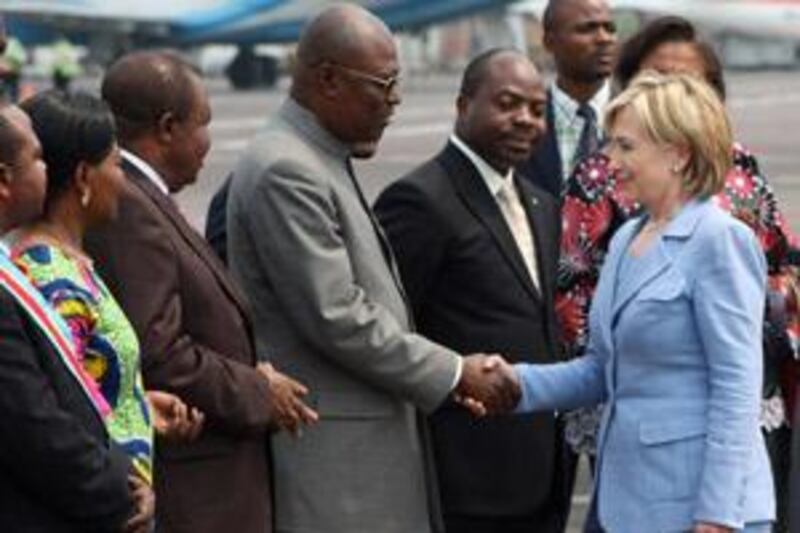Poor Hillary Clinton. She is accused of having a tantrum at a Congolese press conference this week when the truth is that the whole issue was born out of a translation gaffe. The topic under discussion was a multibillion-dollar loan offer from China to the Democratic Republic of Congo; Hillary took affront to the question: "What does Mr Clinton think, through the mouth of Mrs Clinton?" Understandably, this prompted a little annoyance. "My husband is not the secretary of state. I am," she responded tersely.
But what the French-speaking student actually asked was what President Obama thought of the loan, which was subsequently misinterpreted by the translator. Horrified at the wide-eyed reaction of Clinton, the anxious student hurried up afterwards to explain himself, whereupon he was reassured by an aide. But not before video clips made it on to the internet and for stories to circulate over Hillary's hissy fit.
"She does look awfully tired," notes one blogger sympathetically on YouTube. "I can't believe this is our country's top diplomat - forgive us Congo," begs another. It's not the first time Clinton has found herself lost in translation since taking the reins as President Obama's secretary of state. When she met the Russian foreign minister Sergei Lavrov in March, she came with a present, like all good guests. It was a red and yellow emergency button that had the words "reset" and "peregruzka" written on it - a reference to renewing the US-Russo relationship.
"We worked hard to get the Russian word right," said Clinton proudly to her Russian counterpart. Well, Hillary, apparently it wasn't hard enough. "You got it wrong," retorted Lavrov, who informed her that "peregruzka" meant overcharge, not reset. Oh, the fine art of diplomacy. Presumably there was an empty desk at the US State Department the next day. But then think of the riches that translators have given us over the centuries. Myriad ancient texts and advances in science and arts would have been denied to us without their help. And reflect on the fact that the world may have between 5,000 and 10,000 languages (Wikipedia announces this rather vague number, so it must be true). Really, it's little wonder that standards occasionally slip.
In his 1963 speech in Germany, the American President John F Kennedy told the world: "Ich bin ein Berliner." Debate exists to this day about the accuracy of the statement, but some language pedants still chuckle to themselves about the fact that Kennedy announced himself as a jelly doughnut and not as a citizen of Berlin (a "Berliner" being both a resident of the city and a doughnut). President Carter also fluffed a remark in 1977 when, on a visit to Poland, he told the gathered crowd that he wanted to understand their "desires for the future". The following day, there was good-humoured ridicule in the Polish press when it transpired that his translator had mistaken "desires" for "lusts". Whoever knew that diplomacy was such a laugh?
Earlier this year, America found itself the wrong-footed one when Mirek Topolánek, the former prime minister of Czechoslovakia, accused the US of funding economic stimulus packages by selling bombs. Turns out that Topolánek's translator had mistranslated "bombs" and "bonds". A Freudian slip, perhaps. Other countries have had their fair share of translation malfunctions, too. In 2003, that shy, retiring man Jacques Chirac, then president of France, landed himself in diplomatic hot water after telling several Eastern European countries to "shut up" about the impending Iraq war. ("These countries missed a good opportunity to shut up," he was reported as saying.)
Given that French used to be the language of diplomacy, it was somewhat ironic that the French verb "se taire" had been interpreted as to "shut up" instead of the more tactful to "remain silent". As subtle as a smack in the face, Jacques. And it's not always spoken misinterpretations that threaten diplomatic incidents, either. In 2001, a Chinese translation of Tintin in Tibet was rendered Tintin in Chinese Tibet, which is not at all what the Belgian Tintin creator Hergé had intended for his quiffed hero and small dog, Snowy. Cue slight panic from the Belgian foreign minister Louis Michel, in China at the time to celebrate the translation.
"I am not a translator or a publisher and I don't speak Chinese," he said bravely, absolving himself from any trace of responsibility for the drama. The golden rule in diplomacy, it seems, is: when in doubt, blame it on the middleman.





